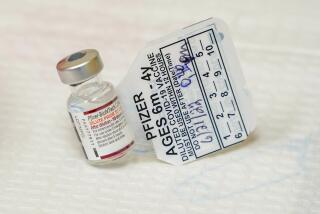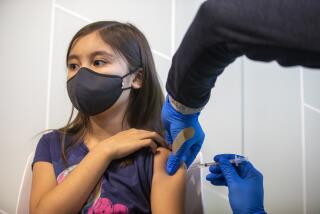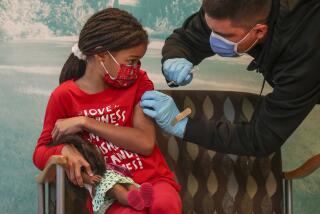Vaccine Not a Risk to Children, Study Says : Medicine: Some parents have feared side effects from the whooping cough component of DPT inoculations.
- Share via
The whooping cough component of DPT vaccines does not, as some have claimed, present a serious health risk to vaccinated children, according to a new study by UCLA researchers.
Studying 60 Los Angeles children who had severe reactions to the vaccine over a four-year period, pediatrician Dr. Dean A. Blumberg and his colleagues concluded that most such side effects--including seizures, fever, prolonged crying and collapses to limpness--were transient effects that represented no long-term danger to the children.
They also report today in the journal Pediatrics that, contrary to previous speculation, there is no evidence of neurological damage to the children.
“We are reassured by these findings,” Blumberg said, “and will continue to recommend without hesitation that infants and children should receive DPT vaccine to protect them against these serious diseases of childhood.”
The DPT vaccine protects against diphtheria, tetanus and whooping cough, also known as pertussis. Children usually get the vaccine in a five-dose series, beginning at age 2 months and continuing at 4, 6 and 18 months, with a final dose between 4 and 6 years.
Reactions to the vaccine usually occur within 48 hours and may include high fever (one out of 100 immunizations), persistent crying (one out of 100), seizure (one out of 1,750) and a collapse episode with limpness and lack of responsiveness (one out of 1,750).
But there have been sporadic reports of brain damage caused by the DPT vaccine. These reports have frightened many parents, who have not had their children vaccinated.
There are now an estimated 4,000 cases of whooping cough--a serious, sometimes fatal respiratory disorder--in the United States every year.
Parent groups, including the Virginia-based Dissatisfied Parents Together, have lobbied for nearly a decade for a re-examination of the vaccine, and Blumberg’s study is one of several such efforts. Blumberg has long advocated use of the vaccine as safe.
The sources of the side effects have been assumed to be two toxic chemicals found in the pertussis part of the vaccine, which is made from killed pertussis bacteria. One of the chemicals, called the pertussis endotoxin, is found in the cell walls of many bacteria and is thought to cause the fever and pain associated with the vaccine.
The second, called the pertussis toxin, is unique to the pertussis bacteria and is responsible for many of the symptoms of whooping cough. Many people have assumed that it causes the more serious side effects, including brain damage. Blumberg established a network of local pediatricians who reported adverse reactions to the vaccine within 48 hours after immunization. His team examined the children within 24 hours.
Among the 60 children who had severe reactions, 32 had seizures only, 14 had collapse episodes, four had persistent crying only, two had seizures and persistent crying, two had high fevers only and six had seizures with high fevers. The researchers found no evidence of brain damage resulting from the vaccine. The UCLA researchers used sophisticated tests to search for the pertussis toxin in the blood of each of the children and found no evidence of its presence, even at very low concentrations. They therefore concluded that the side effects were not associated with the toxin.
That conclusion is in agreement with several other recent studies, said Dr. Lawrence Pickering, a pediatrician at the Center for Pediatric Research in Norfolk, Va. “The most important thing to note,” he said, “is that the pertussis vaccine has not been shown to cause brain damage in any of the studies.”
The side effects were generally found to be associated with the pertussis endotoxin and with the child’s genetic history, a finding that is promising because the endotoxin is not present in new vaccines that are being tested.
Nearly all the 40 children who had seizures had a high or low fever associated with the vaccination, and most had a family history of seizures caused by fever or had had seizures themselves prior to the vaccination.
Blumberg stressed the importance of continuing to vaccinate children with such histories, but recommended that they be given tylenol before the vaccination to reduce the likelihood of fevers and thus of seizures.
The whole issue of such side effects may become moot in the near future, both Blumberg and Pickering predicted.






